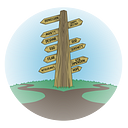Take a Shot
In a recent blog, I described a spiritual lesson about attitudes taught by my tennis coach.
I have learned other lessons in my sporting life. These include improvements in technique.
Like other tennis players, I have worked on improving my technique. My tennis strokes worked, but my coach said that they could be better with some minor changes. I saw other players using the method
my coach recommended. It was working for them. I trusted my coach to steer me
in the right direction. So, I decided to adopt the change.
But a change in technique is difficult. There is resistance. There are several reasons for this resistance.
First, the old technique worked. It was familiar and comfortable. So, under pressure or in a forgetful moment, I found myself reverting to the old ways of making the shot. I knew the new method would be
better; I had practiced it and seen the results. But knowledge is not enough, I had to focus on integrating the change into my shot, and sometimes I lost focus. I might be thinking about the score, or how I look on the court. Whatever the reason, I was not focusing on the new technique and reverted to the old ways of doing things. It took hundreds or thousands of balls to groove the new way of making the stroke, to habituate the new more than the old. To have the new method become automatic in all conditions and situations.
Second, the new technique sometimes seemed awkward. The movement was new, and the feelings that I feel in making the stroke were new, and that felt unpleasant. It felt forced and unnatural.
Third, the new does not always deliver the results, often because it is forced and unnatural. I am not yet used to the new ways. So, the stroke is poorly executed. With the occasional bad outcomes, I begin to doubt the whole effort. The odd misfire casts a shadow over the entire change process.
Changing my tennis stroke reminds me of learning to behave in a new manner in life. A new way of reacting and acting, may be recommended by my sponsor, and I see it being used all around me by fellow AAs, but it can be challenging to integrate and habituate. One example of a new living technique is learning to rely on my connection with God rather than trust in my own judgement. To pause, pray and listen to God, then feel moments of intuition and follow them. Like a new tennis stroke technique, this is
difficult to habituate.
And the reasons it seems difficult to change to a spiritual way of acting are similar to the reasons for resisting changing my backhand in tennis. First, the old ways, relying on self-government, worked.
The results might have been sub-optimal some of the time, but I muddled through. Second, learning to rely on my conscious connection with God required focus; otherwise, I slipped to the old default habits of decision making. If I was focused on the score or how I looked, the old habits of self-government
thinking slipped back into gear. Third, it seemed awkward to trust in an intuition that might or might not have come from God. It felt forced and risky. Lastly, as Bill W warned, we can expect some odd results in the early days of this new way of acting. We should enjoy the unique experience of relying intuitively on God, but be careful; it will not always work well until we get some experience with this new modality of decision-making. Until then, like a new tennis shot, things might look odd.
But pushing through the problems of changing my backhand yielded fruit; my game improved. Pushing through the issues around learning to turn to God during the day and relying on his guidance at points of
disturbance or decision paid off handsomely as well.
